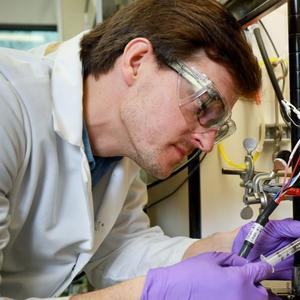ORNL: Bacterial boost for biobased fuels




Oak Ridge National Laboratory
May 8, 2017
BY Oak Ridge National Laboratory
Electrical” bacteria are the key ingredient in a new process developed by the Department of Energy’s Oak Ridge National Laboratory that recycles wastewater from biofuel production to generate hydrogen. The hydrogen can then be used to convert bio-oil into higher grade liquid fuels such as gasoline or diesel.
“We are solving multiple problems at the same time,” said ORNL researcher Abhijeet Borole, who led a multi-year project to develop the system.
The team’s lab-scale demonstration can produce 11.7 liters of hydrogen per day at rates that are required for industrial applications. Borole notes that although more work is required to bring the technology to the commercial scale, their progress demonstrates the potential of microbial electrolysis to make bio-refineries more efficient and economically viable.
Much like a conventional petroleum refinery, the bio-refinery concept is focused on the conversion of plant materials into higher value products, including hydrocarbon fuels and chemicals.
Microbial electrolysis is powered by electrogens—bacteria that digest organic compounds and generate an electric current. Borole put these bacteria to work in breaking down organic acids in liquid bio-oil that is produced from plant feedstocks such as switchgrass. Normally, about a quarter of the liquid bio-oil is contaminated water that contains corrosive acids.
Advertisement
Advertisement
“We are taking this waste, which can be 20 to 30 percent of the biomass that you put into the process, making hydrogen from it and putting that hydrogen back into the oil,” Borole said.
The hydrogen generated from the microbes could displace the need for natural gas, which is used later in the production process to upgrade bio-oil into more desirable drop-in liquid fuels.
“You can recycle the water, produce clean hydrogen and eliminate the natural gas,” Borole said.
The researchers developed a procedure to evolve and enrich a hardy bacterial community that could tolerate the toxic compounds in the biofuel wastewater. This delicate balance also involved optimizing the overall process and system parameters to enable the bacteria’s success.
“You are trying to efficiently extract electrons from hundreds of compounds and make hydrogen,” Borole said. “How do you do that when the plant byproducts are poisoning this bacterial food? You have to find a way to negate or neutralize that poison and be able to produce those electrons at the same time.”
Advertisement
Advertisement
In this application, the bacterial poison comes in the form of products created by the degradation of lignin, a tough polymer found in plant cell walls. But understanding how to build and optimize microbial electrolysis systems that can tolerate and treat contaminated wastewater could have benefits outside of biofuel production.
“These systems have potential for wide-ranging applications, including energy production, bioremediation, chemical and nanomaterial synthesis, electro-fermentation, energy storage, desalination and produced water treatment,” said Alex Lewis, a doctoral student with the University of Tennessee’s Bredesen Center for Interdisciplinary Research and Education.
The research team is now focused on completing a life-cycle analysis for the technology to evaluate its greenhouse gas emissions and water use.
The team’s latest paper is published in Sustainable Energy & Fuels as “Proton Transfer in Microbial Electrolysis Cells.” The project was funded by DOE’s BioEnergy Technologies Office and ORNL’s Seed Money program.
ORNL is managed by UT-Battelle for DOE’s Office of Science. DOE's Office of Science is the single largest supporter of basic research in the physical sciences in the United States, and is working to address some of the most pressing challenges of our time. For more information, please visit http://science.energy.gov/.
Related Stories
The U.S. Department of Energy Bioenergy Technologies Office (BETO) announced up to $23 million in funding to support research and development (R&D) of domestic chemicals and fuels from biomass and waste resources.
The U.S. DOE has announced its intent to issue funding to support high-impact research and development (R&D) projects in two priority areas: sustainable propane and renewable chemicals and algal system cultivation and preprocessing.
Sens. Sherrod Brown, D-Ohio, and Pete Ricketts, R-Neb., in August introduced the Renewable Chemicals Act, a bill that aims to create a tax credit to support the production of biobased chemicals.
The Chemical Catalysis for Bioenergy Consortium, a consortium of the U.S. DOE’s Bioenergy Technologies Office, has launched an effort that aims to gather community input on the development of new biomass processing facilities.
USDA on March 8 celebrated the second annual National Biobased Products Day, a celebration to raise public awareness of biobased products, their benefits and their contributions to the U.S. economy and rural communities.
Upcoming Events










